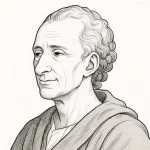“Life was given to me as a favor, so I may abandon it when it is one no longer.”

- January 18, 1689 – February 10, 1755
- French
- Political Philosopher, Jurist, Author of The Spirit of the Laws
table of contents
Quote
“Life was given to me as a favor, so I may abandon it when it is one no longer.”
Explanation
Montesquieu presents a deeply individualistic and philosophical view of life as a conditional gift—not an obligation. By stating that life was given “as a favor,” he implies that its value depends on whether it remains a source of dignity, meaning, or peace. If life becomes unbearable, degrading, or devoid of worth, the individual has the moral authority to relinquish it. This reflects a belief in personal autonomy over one’s own existence.
This idea resonates with ancient Stoic philosophy, particularly thinkers like Seneca, who argued that rational beings have the right to choose death over a life of suffering or dishonor. Montesquieu, writing in the Enlightenment, carries forward this tradition of rational self-determination, where liberty extends even to the final decision of whether to continue living. His view challenges religious or legal doctrines that treat life as inviolably sacred regardless of its quality.
In contemporary discourse, the quote touches on sensitive debates around euthanasia, terminal illness, and the right to die with dignity. Montesquieu’s assertion underscores that true respect for human life includes respecting the individual’s judgment about its value. It is a call for compassion and rationality in recognizing that life, while precious, should not become a prison when it ceases to be a gift.
Would you like to share your impressions or related stories about this quote in the comments section?

